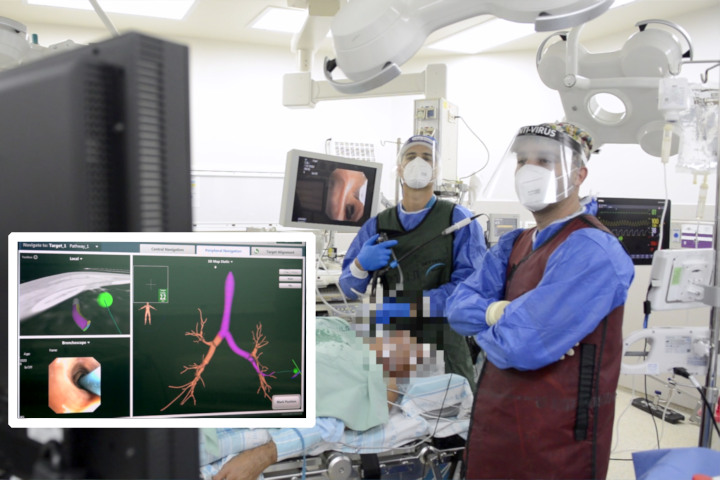Rambam’s Pulmonology Institute has recently implemented an advanced system that acquires minimally invasive biopsies in areas of the lungs previously unreachable without surgery. The new technology collects multiple biopsy samples accurately, quickly, and painlessly, with no incisions.
 Using the new navigation system at Rambam. The inset shows the display observed by the doctors. Photography: Rambam HCC
Using the new navigation system at Rambam. The inset shows the display observed by the doctors. Photography: Rambam HCC
Evaluation of suspicious lung lesions is essential for vital decisions regarding the treatment of diseases such as lung cancer. Some biopsies of these lesions may be obtained using minimally invasive procedures, such as transthoracic needle biopsy. However, for many patients, the lesions are in areas of the lungs that can only be reached through complex, and often painful, surgical procedures. Advanced technology recently introduced at Rambam Health Care Campus is changing reality for these patients.
The Pulmonology Institute’s new bronchoscopic navigation system enables accessing areas of the lung that are close to the main airways as well as more distant peripheral regions, all without having to make an incision, although the patient is anesthetized. Before the procedure, a CT scan of the patient’s lungs is performed. An endoscopic tube equipped with a fiber-optic camera is then threaded into the patient’s lungs via the mouth. The system then creates a 3D-reconstruction based on the CT data that shows clinicians exactly how to navigate the complex twists and turns of bronchial tree. Multiple lesions in one or both lungs may be biopsied in a single procedure. In addition, after reaching the lesion, the clinician can insert markers or apply a medical dye to guide future treatments. Perhaps the biggest plus is this: The entire procedure can be performed on an out-patient basis – without hospitalization.
Dr. Yaniv Dotan, Deputy Director of Rambam’s Pulmonology Institute, notes, "The chances of recovery from early detection of lung cancer are very high. The problem with this type of cancer is that when the signs are apparent, the cancer is already in an advanced stage in the patient's body. The new system allows patients to receive an early diagnosis, and we will be able to accurately tailor a unique treatment for each finding." He adds, "This system has great therapeutic potential which, in the future, will allow us to reach and more effectively treat lesions in a targeted manner."
Dr. Ori Haberfeld, attending physician in Rambam’s Department of Thoracic Surgery explains, "In the past, to evaluate suspicious lung lesions in challenging locations or located in both lungs, we needed to perform a number of invasive procedures that included opening the chest wall. This approach greatly increased patient suffering, the period of recovery, and necessitated extensive time and preparation by the surgical team. Today, we perform these biopsies in a single procedure, simply navigating from one lesion to the next, precisely, rapidly, and most important—with little or no pain to the patient.

